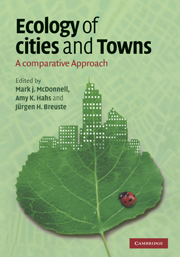Book contents
- Frontmatter
- Contents
- List of contributors
- Preface
- 1 Introduction: Scope of the book and need for developing a comparative approach to the ecological study of cities and towns
- Part I Opportunities and challenges of conducting comparative studies
- 2 Comparative urban ecology: challenges and possibilities
- 3 Frameworks for urban ecosystem studies: gradients, patch dynamics and the human ecosystem in the New York metropolitan area and Baltimore, USA
- 4 Comparative effects of urbanisation in marine and terrestrial habitats
- 5 Comparative ecology of cities and towns: past, present and future
- 6 Comparative urban ecological research in developing countries
- 7 Using models to compare the ecology of cities
- Part II Ecological studies of cities and towns
- Part III Integrating science with management and planning
- Part IV Comments and synthesis
- References
- Index
- Plate section
3 - Frameworks for urban ecosystem studies: gradients, patch dynamics and the human ecosystem in the New York metropolitan area and Baltimore, USA
Published online by Cambridge University Press: 04 March 2010
- Frontmatter
- Contents
- List of contributors
- Preface
- 1 Introduction: Scope of the book and need for developing a comparative approach to the ecological study of cities and towns
- Part I Opportunities and challenges of conducting comparative studies
- 2 Comparative urban ecology: challenges and possibilities
- 3 Frameworks for urban ecosystem studies: gradients, patch dynamics and the human ecosystem in the New York metropolitan area and Baltimore, USA
- 4 Comparative effects of urbanisation in marine and terrestrial habitats
- 5 Comparative ecology of cities and towns: past, present and future
- 6 Comparative urban ecological research in developing countries
- 7 Using models to compare the ecology of cities
- Part II Ecological studies of cities and towns
- Part III Integrating science with management and planning
- Part IV Comments and synthesis
- References
- Index
- Plate section
Summary
Introduction
This chapter addresses the conceptual frameworks that have been used in urban ecological studies in two US metropolises, and the theoretical challenges for urban ecology that flow from these experiences. The two topics relate well because frameworks lay out the structure of knowledge in a subject area, and the theoretical assessment addresses the applicability of frameworks beyond the two cities used here. The frameworks began to be articulated with the establishment of the Urban–Rural Gradient Ecology (URGE) programme in the New York City metropolitan region in the early 1980s (McDonnell and Pickett,1990). That programme continued until the relocation of its leader, Mark McDonnell, to Australia in 1998.
Although the urban–rural gradient framework has been effective in studying the biological components of human-dominated ecosystems, there has been an increasing call to better integrate the biological, physical and socio-economic components of urban systems (Niemelä et al., 2000; Grimm et al., 2000; Collins et al., 2000; Pickett et al., 2001; Alberti et al., 2003). In the Baltimore Ecosystem Study, a Long-Term Ecological Research project (LTER) funded by the National Science Foundation, which is part of a network of 26 long-term studies in various ecosystem types located throughout North America and its territories (http://www.lternet.edu), the urban–rural gradient framework has been extended to include social sciences (Grimm et al., 2000). Because the Baltimore Ecosystem Study (BES) builds closely upon the New York URGE study, they encompass a wide range of approaches to urban ecological studies and present an excellent opportunity to examine conceptual frameworks that can be used to promote and integrate urban ecological studies.
- Type
- Chapter
- Information
- Ecology of Cities and TownsA Comparative Approach, pp. 25 - 50Publisher: Cambridge University PressPrint publication year: 2009
- 7
- Cited by

